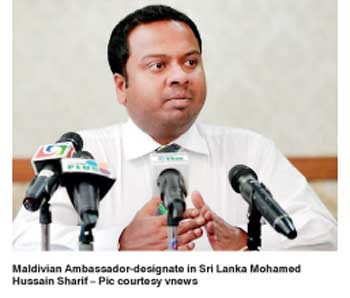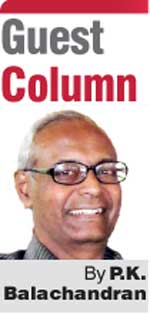Sunday Feb 22, 2026
Sunday Feb 22, 2026
Saturday, 16 September 2017 00:01 - - {{hitsCtrl.values.hits}}
The Maldivian Ambassador-designate in Sri Lanka, Mohamed Hussain Shareef, has strongly refuted contentions by the opposition Maldivian Democratic Party (MDP) and the US Acting Assistant Secretary of State for South and Central Asia, Alice G. Wells, that the Indian Ocean archipelago is a hotbed of Islamic radicalisation with grave security implications for South Asia, the US, and the international maritime trade route.
While admitting that there has been a change in the Islamic culture in the Maldives in terms of the dress code and religious practices, as indeed the world over, envoy Shareef said that Maldivian Islam is still very moderate and cannot, by any stretch of imagination, be described as “extremist”.
And the Maldives is by no means a hotbed of Islamic terrorism, he stressed. Admittedly, there are hard line Islamic groups, but these are small, fragmented and ineffective. They are audible because there is democracy since 2008, and people have begun expressing themselves in the public domain thanks to the tremendous expansion of the social media.
 But even given the advantages of democracy and technological development, the impact of extremist propaganda has been negligible, Shareef said.
But even given the advantages of democracy and technological development, the impact of extremist propaganda has been negligible, Shareef said.
Dire need to
protect tourism
Prevention of terrorism is particularly important in the Maldives because any terrorist incident in the country would be catastrophic for its largest industry, tourism, the envoy said.
“Maldives welcomes 1.5 million tourists every year and the safety and security of visitors is among the highest priorities of the government,” he underlined.
Statistics provided by the Maldivian Tourism Ministry say that there has been a 6% increase in arrivals, comparing  the figures for January-June 2016 with January-June 2017. Significantly, there has also been an increase in arrivals even from the Western world which is very sensitive to political disturbances and travel advisories.
the figures for January-June 2016 with January-June 2017. Significantly, there has also been an increase in arrivals even from the Western world which is very sensitive to political disturbances and travel advisories.
“It is regrettable that fear mongering on the issue is often led by the irresponsible opposition parties in the country. Funded overseas media depicts the Muslim veil and beard as signs of growing extremism,” Shareef pointed out.
The Maldives has seen political turmoil with one of its former Presidents Mohamed Nasheed in exile in the UK. And there have been serious charges of undemocratic actions against the incumbent President Abdulla Yameen. But there has been no terrorist act after the 2007 Sultan Park IED blast in Male in which 12 foreigners were injured.
Wells’ statement in Congressional Committee
Ambassador Shareef’s comments were sought in the context of a statement made by the Acting US Assistant Secretary of State for South and Central Asia, Alice G. Wells, at a Congressional hearing in Washington recently.
Wells said: “The United States has real concerns about the status of rule of law and democracy in the Maldives. Lack of higher educational opportunities, high youth unemployment, rise of social media, and weak institutions all contribute to an environment in which Islamist violent extremism is on the rise.”
“Our work with the Government to combat violent extremism remains critically important, in a country with a grim distinction: per capita, it has produced more terrorists who have fought in Iraq and Syria than any other country in the world.”
“The State Department’s request for $ 440,000 in foreign assistance for the Maldives is to continue “limited support for maritime security cooperation,” she added, noting “threats posed by narcotics trafficking, piracy in the Indian Ocean, and seaborne trade in illicit materials of potential use for terrorist activity.”
The Maldives abuts sea lanes through which pass two-thirds of the world’s oil and half of its container shipments, Wells underlined.
Contentions rebutted
Answering these charges, Ambassador Shareef said: “With the enactment in 2015 of the Prevention of Terrorism Act (PTA), important measures have been implemented to root out terrorism and violent and violent extremism including the establishment of the multi-agency coordinating body, the National Counter Terrorism Center (NCTC).”
“Through screening and licensing it is ensured that all religious clerics, preachers and lecturers are educated in moderate (true) Islam. It is seen that religious education does not incite the youth to violence. The national curriculum places a high emphasis on moderate Islamic values and tolerance.”
On the PTA, Shareef contended that it “largely mirrors legal steps in the UK in the fight against extremism, including advanced monitoring and extended detention of suspects”.
The threat of religious extremist attacks are on home soil is continuously monitored, and has been found to be relatively low. But the issue of Maldivian participation in foreign armed conflicts has been identified as a major concern, Shareef admitted.
“But the numbers of Maldivians going abroad to fight for Islamic groups have been few in comparison with other countries,” he contended.
In fact, the Maldives does not figure in the tables prepared by the International Center for the Study of Radicalisation (ICSR) for the year 2015. Out of the 20,730 foreign nationals fighting for the IS in various parts of the world, 1,200 were from France, 1,200 from Russia, 600 from the UK and another from Germany.
By 2017, the number of fighters from UK had swelled to 850. Maldives was not worthy of mention.
“Often encouraged by irresponsible opposition politicians the figure at any given time is largely inflated,” Shareef charged.
“And given the Maldives is a wholly Muslim society of approximately 400,000, the practice in the Western press to simplify the issue by stating the number of such foreign fighters on a per capita basis has not been helpful.”
Mentioning a per capita figure vis-à-vis a small population gives the listener an inflated picture, a very wrong impression.
However the Maldives has not lowered its guard in regard to its citizens going abroad to fight for the ISIS or al Qaeda.
“In actual fact, the NCTC is working very closely with law enforcement and anti-terror agencies across the world including the US, India, UK, Australia, Thailand, Malaysia, Turkey and Sri Lanka. It has successfully pinpointed suspects and intercepted many of them at transit points,” the envoy said.
The new 2015 PTA is designed to contain the threat of returning fighters by monitoring ,education rehabilitation and integration into society, he added.
Referring to the 2007 Sultan Park incident in Male in which 12 foreigners were injured, the Ambassador said that the incident jolted the Government into action on the issue of violent extremism.
“The suspects were found and handed lengthy jail sentences. Since the current Government assumed office in November 2013, there has been zero tolerance of violent extremism. It has been encouraging youth aspiring for a religious education to seek seats in reputed, moderate, Islamic universities rather than madrasas and other institutions where they may be brainwashed into taking up arms,” Shareef said.
Since the Maldives has one of the highest penetrations of social media anywhere in the world, vigilance against their misuse by religious extremists has been stepped up, the Ambassador added.